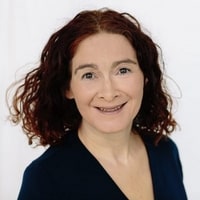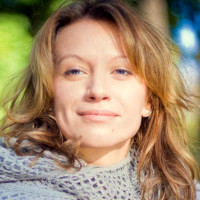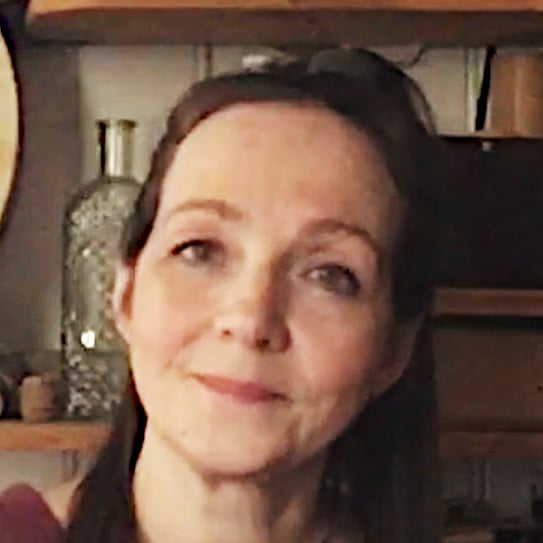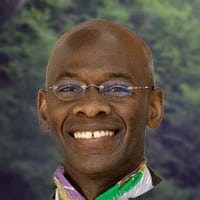Read the transcript of Michel DeGraff's Video here ◂
Michel: Hello, my name is Michel DeGraff. I was born in Haiti. I’m a professor of linguistics at MIT, which is the Massachusetts Institute of Technology. And I’m also the founder and director of the MIT-Haiti Initiative.
Nerina: Thank you for joining me, Michel. What are your main research interests?
Michel: My main research topic in linguistics has been to try to understand the way that new languages come into being, and how new varieties of languages also emerge. My focus is on the interaction between the contact of populations and the creation of new varieties of language. In a way, my laboratory case is my own native language, Haitian Creole, which emerged in the Caribbean, in Haiti, back in the 17-18th century, out of the contact between varieties of French and various West-African and other African languages. And out this contact, this new variety emerged, which we now call Haitian Creole, or Kreyòl in Haiti.
I also work on the relationship between linguistics and education, especially in the context of my native country, Haiti. I think what we’re doing there can also be used as a model for other countries that speak a local language that, because of historical reasons, has been stigmatised, and excluded from the schools, courts and government, and other domains where knowledge and power are created and transmitted. So, I’m hoping that the work we are doing in linguistics can have a positive impact on education and development in countries like Haiti, but also other countries in the Global South.
Nerina: What makes your first language, Kreyòl, so unique in your opinion?
Michel: From my perspective, what makes Haitian Creole and other Creole languages special is the fact that both their own history and development and the way they have been studied by scholars reflect colonial history. At the same time, because of their very origins in situations of really drastic power inequality, I mean slavery, colonization. now those languages offer a path out of domination and stigmatization, a path into liberation. For me, that is what makes these languages very special: the fact that they come out of a history of colonial struggles. In a way, there are still the theater of struggles. But if you better understand how they emerged, how they are created, but also if you understand their capacity for education, literature and liberation, then they can be used for development in a way that hasn’t happened yet in the case of many Caribbean communities but also other communities in Africa, Asia, Latin America, where you have either Creole languages or what we think of as “indigenous” or “local” languages being spoken.
Nerina: The point is that French is the official language of Haiti, but Kreyòl in Haiti is not the language of a minority but it is the language of a majority, right?
Michel: Absolutely. What you’ve just said, Nerina, is absolutely right. In Haiti, Kreyòl is the language… I wouldn’t even say of the majority… but I’d say it’s the language of the totality. In Haiti, everyone speaks Kreyòl. In fact, you can hardly function there in French, except if you were to stay at a hotel or in the capital or in fancy neighbourhoods. Once you go out in the outside country, on the streets, into the busy vibrant neighbourhoods where people are living their lives, you have to use Kreyòl. So, everyone speaks it, even those who are forbidden to speak it! I remember very well when I was in school, I went to a school run by French Catholic brothers, I was forbidden to speak Kreyòl, but yet I learnt it, I speak it. In fact, it’s my soul language, my first language. Although my own parents were very concerned that I should speak French first, but in fact, Kreyòl is my native first language. And it’s the first language for most Haitians.
Nerina: How does this situation that you are not allowed to speak in your native language and that somehow your native language may be seen as not important or not even a real language, how does this affect you?
Michel: I often ask this very question, how does this stigmatization and oppression of a native language, how does it act on a child? I’ve done research on that. So I have many videos of children in classrooms and how their languages are being suppressed. Often when they are being taught to speak French, and if they have a Kreyòl accent or they pronounce the vowels in a Kreyòl way, the teachers look down on them and make fun of them. Then those children come to believe that what they speak at home, what their family speaks is a broken language, is broken French.
So, what it does to them, I think, is to make them believe that they are broken people. It makes them believe that they are inferior, that for them to be fully human they have to speak French. To me, the effect of that entire system, of what I would say is MIS-education, is undermining the entire foundations of our nation. In the school, the children are being taught from day one to mimic. In fact, they learn how to read not as they learn how to think. They learn to parrot, to mimic, because they read sentences by sounding out words without understanding what the words mean.
So, what it does to them? It teaches them that you go to school not to learn, but to become a parrot, to pronounce or mimic French words without understanding them. So, it becomes normal for them that learning means parroting French text without understanding it. I can imagine what in the long term it does to the nation because you have cohorts upon cohorts of children who come out of school without really knowing how to read a text, without any capacity for critical thinking. Even teachers teach by repeating without questioning what they repeat.
Nerina: What is the relationship between language and power?
Michel: Well, I think of the situation of a country where everyone speaks Kreyòl and a small group speaks French and yet French is the language used for power. I think it’s a good example of what psychologists and philosophers and sociologists have studied as the power of ideology, the power of prejudices to even affect those who are being oppressed. What you find is that it has been so long, since the 17th-18th century, that French has been presented as the real language, the superior language. Then, linguists and creolists have also played a role in that, in ranking Creole languages as if they were the world’s simplest languages, as if they were languages that were below in terms of capacity of expression, below languages like French for example.
So, what you find is that even those who speak only Kreyòl are also convinced that in order for them to achieve citizenship, to be real and fully human, they have to speak French. So, Steven Biko said something that is very important: he said that the most powerful tool of the oppressor is the mind of the oppressed. The idea here is something that Michel Foucault, Pierre Bourdieu and Frantz Fanon understood very well: that hegemony works because those people who are being excluded, those people who are being oppressed, they’ve been convinced to believe in their own inferiority, in the validity of why they’re oppressed.
And that’s why the situation in Haiti still holds, because you have parents who are so poor they give all this money to schools, and they don’t care whether the school teaches the kids math or science or literature, all they care about is whether the kids learn French, as if French is the key to knowledge and to humanity. But, no, it’s not. No language can have that kind of function, right? The best tool to develop your humanity and your knowledge is your native language, and with that, you can also learn other languages. So, that’s why I think it’s really important for teachers, scholars, leaders, linguists and anthropologists to really look at this issue very closely—also psychiatrists—to deeply understand how to correct it, because until it’s corrected, you’re going to have a nation that’s totally upside down. As my colleague Yves Dejean says, we have a country that’s upside down because the schools are upside down.
Nerina: Haiti is a beautiful country, has a long history even pre-Columbus, and after the years of the colonization it was a proud moment when Haiti became independent before other countries did at the beginning of the 19th Century. But what do you think or feel went wrong, why does Haiti still struggle?
Michel: I think that Haiti, as you said, is a beautiful country with an amazing history. It was one of the first lands to welcome Columbus when he got lost. Of course, he didn’t discover Haiti. He just got lost there. That’s why he called it the “West Indies.” And the Amerindians welcomed him to their own detriment because very quickly they were decimated. It was the first genocide in the Americas.
We’ve had this glorious history whereby the Europeans brought in the Africans as enslaved labourers, then these Africans managed to outwit the Europeans: they won an amazing independence war, back in the beginning of the 19th century. There’s something that our founding fathers understood. Jean-Jacques Dessalines who was our first president understood that we may have won the war of independence in terms of getting rid of the French, but if we don’t also become independent culturally, intellectually, linguistically, then we won’t really be independent.
He also understood that there was this danger of neocolonialism. So although the French had been expelled, there were descendants of the French in Haiti, there were also free blacks who for selfish interest wanted to just replace the French and not share the wealth with their compatriots, but create a new class of colonizers that could then oppress their own compatriots.
This is what we’ve seen. We’ve seen that in Haiti from the very beginning there was this small class of free blacks, the blacks who were free even during the colony, but also the mulattoes (descendants of French who mated with African women), and they replaced the colonizers, the French colonizers. One thing that they did that was actually quite clever was to enlist the school system as a way to preserve power, because very early on, although there were attempts at the very beginning to say ‘well, we need to use Kreyòl for the school system because given that we are a population that speaks mostly Kreyòl that’s what should be used’, but those proposals from the very beginning were excluded. So, what happened is that the school system very early on was based on French which means that only those who could speak French, and that was already a very small minority, would have access to success.
So, it’s basically a privilege given to the elite that became cemented, and became so entrenched in the society. That’s what we’ve been living with since then. So that’s the tragedy of Haiti, that’s the problem. But now with all that we know about language and education, I think that we can do another revolution, which is to convince the leaders and the population that our native language, our national language, is essential for our freedom.
Nerina: You wanted to use your knowledge to change the situation, right?
Michel: Absolutely. I really believe in something that Karl Marx said, that what is important is not only to understand the world, but it’s also to be able to change it. In linguistics, and in all the humanities—anthropology, history, psychology…—we have all this knowledge about the way the mind and society work. But what good does it do if we have all this knowledge, but we cannot make the kind of changes that will make the world better, and the lives of people better? What good does it do if we build all this knowledge about Creole languages, but at the same time Kreyòl speakers cannot benefit from this knowledge? Sometimes it’s even worse, Kreyòl speakers sometimes suffer because of the kind of statements and theories that linguists have been producing for centuries about Creole languages, classifying them as if they were the world’s simplest languages. This is the very reason why certain scholars and educators prefer to use French instead of Kreyòl, because why use a language that’s ‘simplest’ when you can use a more ‘sophisticated’ language, meaning French. You see…
So this is one area where the knowledge being produced by linguists is actually undermining the livelihood and the future of the very speakers of these languages that we study. At least, we have to understand the impact of these kinds of ‘knowledge’ and question the basis for them. Because if we have any doubt whether our knowledge is solid, then we should really think of what are we doing in the real world with this knowledge? How can we make it better?
Nerina: You are the founder and director of the MIT-Haiti Initiative. When and how did it start?
Michel: I like to think of it as having its roots from my childhood because as a child I was never allowed to use my native language in the school system as a means of knowledge. I was prevented from using it. When I was a computer scientist, my first job as a professional computer scientist was to write programmes for linguists who were trying to help computers to understand language, to have computers able to read, say, the New York Times and be able to pronounce text for people who cannot read, for example. As I was doing this work, I couldn’t help but think about my own language, Kreyòl, and I realised that if I were to write the same programme for Kreyòl it would also work maybe even better because in Haitian Creole we have a very transparent and logical spelling system which is a lot better than what you have both for English and French. It’s a very logical, transparent spelling where every sound is always written with the same letter. It’s very rigorous and logical, which would make it much easier for a programme to be able to read Haitian Creole as compared to French or English.
From that moment onwards, I was always thinking about the use or misuse of Haitian Creole, our national language, in the school system in Haiti.
Now, to make a long story short, in my work as a linguist I always kept in touch with colleagues in Haiti. The one colleague that really influenced me a lot, his name is Professor Yves Dejean, who used to run this state office to promote Kreyòl in the 90s. So, Yves Dejean invited in the mid-90s to do a seminar at the Kreyòl Language Bureau in Haiti, and there I met other linguists who, like me and Yves Dejean, understood the importance of promoting Kreyòl as the main language of education. So, we did some work together, training young linguists to understand the structure of Haitian Creole and to also realise that it has the full complex structure that makes it capable of expressing science, mathematics, philosophy… so there is no reason to exclude it from the school system.
So, when the earthquake happened in 2010, I was on this phone call with Yves Dejean, and all of a sudden, we got cut off! Ten minutes after, I realised that there was this major earthquake in Haiti. So, of course, I was very worried! Thank God, he was safe, his house was safe.
But then in the aftermath of the earthquake, me and my colleagues at MIT were discussing the best way that we could help. We realized that the best way was not to send money or bottles of water. The best way to help was to try and change the school system from the inside. In fact, Yves Dejean wrote a manifesto soon after the earthquake, where he says that the best way to rebuild Haiti is not with cement or with infrastructure, but it’s to rebuild Haiti from within, from the soul, to change the attitudes of the leaders of the society towards their own native culture, and their own native language. If we can do that, then we can really rebuild a Haiti that will be better for all.
So that moment after the earthquake and talking to Yves Dejean, I realised that what I could do at MIT is to try and create a team of colleagues, because at MIT we have very good scientists, educators, mathematicians, and engineers. Then we could see how we could bring some of our know-how and share it with Haiti, at the same time also expand our own humanity and expertise at MIT. So, it would be a two-way relationship where MIT would be sharing with Haiti, but at the same time, Haiti, with its own rich history and expertise and human capital, could share with us. So basically, both MIT and Haiti would expand and become better in the process. It would be an opportunity for both MIT and Haiti to try to create a new kind of university that might become a model, not just for Haiti, but for the entire world.
Nerina: What are the main pillars of this programme?
Michel: Our goal in the MIT-Haiti Initiative is to try to share with Haiti the best know-how at MIT when it comes to teaching and learning, because MIT is one of the best universities in the world. I think we’ve become very good at developing methods and tools and resources for students to learn in a very creative fashion. This notion of creativity is at the core of the initiative, because when I was growing up in Haiti I remember very well that, in order to succeed as a shining student, it was a matter of just memorising lessons, and being able to recite them by heart. If there is one feature that characterises the Haitian school system, it is rote learning. It starts from kindergarten and first grade, where children are being taught to read text they don’t understand. All that matters in ‘reading’ is to be able to sound out and repeat words without understanding them in any deep way. So, this is what my colleagues and I felt, from my own experience as a student, needed to be changed in order for the country to use the full capacity of its citizens who are very creative. If you look at Haitian art and at children on the farms in the rural country, those children are very creative, and yet they go to school, and their creativity is shut off and not exploited. So, the goal then was to create a school system, from kindergarten to university, where you can learn in a very creative way, you can learn in an active fashion.
The main aspect of the MIT-Haiti Initiative is to introduce methods and tools for active, creative, interactive learning. To do that, we need one indispensable condition which is that the students have to be able to use the language they are most fluent in because they cannot be creative learners if they have to use a language that they are not comfortable in. So that’s the second piece of the initiative.
The third piece is something that MIT is very good at, which is the use of software and tools that trigger and promote this kind of interaction.
So that’s basically the MIT initiative.
Nerina: What is the relationship between language and personality?
Michel: I think in Haiti the relationship between language and personality is such a clear one. For example, if you go to Haiti, you will be pressed to find a typical Haitian giving any joke in French. If you are in a courtyard or on the playground, all the jokes and stories and songs happen in Kreyòl. And those in that context who switch to French, they switch to French to be formal. When you go and court a girl, in order to impress her, you have to speak French, so she thinks that you are smart and well educated and of a good social class. But then once you get comfortable with the girl, you would switch back to Kreyòl. Once I was on the phone talking to my girlfriend, I was maybe 11 or 12, and we were talking in Kreyòl, and the mom heard us speak Kreyòl, got offended, and picked up the phone and said ‘Sir, please speak French to my daughter! You are disrespecting her by speaking Kreyòl’. I could speak French, but I was so frozen by this command that I had to hang up the phone. This shows you how, in Haiti, that link between language and personality is so clear because you cannot be yourself in French. For most Haitians, to be true to yourself is to speak Kreyòl.
Nerina: What motivates you, Michel?
Michel: I think it’s my own history in many ways. But also when I go to Haiti and I see those children and speak to them, I can feel and hear their intelligence and creativity and desire to succeed and I can feel that they have the capacity to succeed. Then, to look at them in the school and they start failing, but it’s not because they are stupid. They start failing because the school system is set against them. That is what motivates me.
Nerina: Do you have a dream?
Michel: My dream, really, is to see the Haitian leadership own that project because, so far, the project has been pushed on the MIT side, and by a growing number of Haitian teachers and faculty at the level of high school, elementary school, and university. But, for that project to have fruit in the long term, at some point it has to be owned by the Haitian society in total—meaning the government, civil society, the parliamentary system….
So my dream is that at some point, hopefully soon in the future, there will be political leaders in parliament and in the executive , alongside the society and all the NGOs, that will realise that for the country, or any project, to succeed, there has to be models like the one we are promoting where the national language is at the core of the project, but also that it be participatory—that everyone can participate without any barrier of language or technology. Of course, I would hope that a stronger alliance between MIT-Haiti and the powers that be both in Haiti and beyond.
And eventually the bigger dream is to have this initiative become a model for other communities—in Jamaica, Curacao, Seychelles, Mauritius, Latin America, Africa, and all over. Did you know that 40% of students are still being taught in a foreign language? That’s a huge number. And also what is really crucial is that there is a direct correlation between those countries that do not use their national language and the countries that are impoverished. So, the most impoverished countries are also those that do not make use of their local languages. So, the bigger dream is that this model will be applied globally, that in each community with a local language, the school system will enlist that local language in the teaching. On paper this is what UNESCO, UNICEF, the World Bank, USAID… that’s also what they believe in. Obviously, there is some blockage against this. But hopefully, in my big dream, those blockages will disappear.
Nerina: Is there a question that nobody ever asks you but you wish somebody would?
Michel: One question that I would like to be asked is: What would I have loved to do if I were not doing linguistics? What other profession would I have liked to have had!
Nerina: And what would you have become?
Michel: I have asked myself that question many times. And I answer it when I go to dance class! I have a dear friend who is an Afro-Haitian dance teacher, and I’m part of his company’s board as an advisor, and I often like to go to his dance performances. Whenever I see beautiful dance performances, I wish that I grew up in a country where boys could have taken dance lessons and become dancers. When I dance it makes me feel really good! So, sometimes I wonder if I would have enjoyed being a professional dancer, would I have enjoyed dancing maybe ballet or Afro-Haitian dance or the kind of dances that the Alvin Ailey dance company performs because they are so beautiful. It’s like a different language, but a beautiful language that people can speak even though they come from different backgrounds. So, in Jean Appolon’s dance classes, when you go there on Saturdays, you see people from all walks of life, of all ethnicities and sizes and ages, and all together they dance beautifully, and when in the class everybody feels so good and so happy! You see this community they built through dancing, and even though people don’t speak to each other that much. But they dance together, they have the drums going through their souls together, it creates that kind of coziness and love and bond that I rarely experience elsewhere. So that’s what I think I would have liked to become maybe, a dancer.
Nerina: My last question, what is life about?
Michel: Well, it’s like what I tell my little boy, that life is trying to make a change to make the world better. It could be very small, it could be something you do within yourself or in your family or neighbourhood. But in your life, if you can make that small change that will make someone’s life better, then it makes life worth living. Life is also about love: without love, life wouldn’t be worth living. That’s what I think life is about: to make some change that will make someone’s life better, and to fall in love and enjoy love and love other people and be loved by other people. That makes life worth it!
Nerina: Thank you so much for this conversation.
Michel: Thank you Nerina, that was a nice interview!
Nerina: And thank you for watching, thank you for listening, thank you for sharing. If you have any suggestions please feel free to reach out to me. See you soon, and keep wondering. Bye, ciao.










